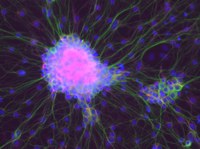
TP is a key protein in vascularization and nucleoside metabolism. We have demonstrated that MNGIE patients lose 70% of their enteric neurons. Is its absence neurotoxic? What about the underling mechanism?
Our project is based on the idea that vascular abnormalities observed in MNGIE patients could play a key role in the manifestation of gastrointestinal symptoms. First, our study aims to verify whether similar alterations are also present in severe idiopathic gastrointestinal dysmotilities, based on the hypothesis that there are common pathogenetic mechanisms between these disorders.
At the same time, in collaboration with Prof. Karl-Herbert Schaefer from Hochschule Kaiserslautern, we are examining how TP deficiency influences the enteric nervous system. The loss of 70% of enteric neurons in MNGIE patients suggests possible neurotoxicity related to the absence of TP. This study aims to clarify the role of microvascular and neuronal alterations in the genesis of gastrointestinal symptoms in these conditions.
The multidisciplinary approach adopted not only aims for a deeper understanding of complex gastrointestinal dysmotilities but also focuses on the development of targeted therapeutic strategies, with the goal of improving the quality of life for patients suffering from these debilitating diseases.